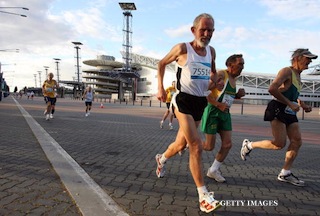
Last year, two large studies, including one in Copenhagen, found that running extends life expectancy by as much as six years. But there was a catch: People who ran 15 to 20 miles, or about two and half hours, per week enjoyed the added years. Those who ran 30 miles or more did not live longer. Moreover, the higher-mileage runners showed signs of heart scarring.
That data suggested there is a threshold to running's benefits, a ceiling at which we'd be better off resting or maybe walking than logging more miles. But Martin Matsumura, M.D., a cardiologist and researcher at the Lehigh Valley Hospital in Allentown, Pennsylvania, isn't convinced that's the case. He suspects other factors, such as family history and medication use, contribute to the adverse effects on the heart, and he's launched a study to begin to uncover them.

"I have a suspicion there are confounders, other habits that are connected to the cardiovascular events, and that it's not, 'If you run beyond 30 miles [per week] you scar your heart and drop dead sooner,'" Matsumura said by phone from his office in the Lehigh Valley. "But what are those habits? What differentiates these runners? That's part of what I hope to find out."
Plus: 6 Ways Running Improves Your Health
The study consists of an online survey directed at runners age 35 and older. It asks 45 wide-ranging questions, from weekly mileage to smoking habits to coffee consumption. Family health history is assessed, as is the use of ibuprofen and other non-steroidal anti-inflammatory drugs and thyroid medication, many of which may have negative effects on the heart.
Matsumura said the study also aims to begin teasing out what degree of running is most beneficial. It will offer a snapshot of masters runners' training and racing habits as well as their perception of running's risk to the heart.
"There's a growing population of masters runner who want to maintain not just fitness but competitiveness, but there's very little guidance on how to assess risk to the heart involved in running as you age," he said.
Plus: How Type of Exercise Affects Blood Pressure
Matsumura's own heart problem influenced his decision to conduct the research. Matsumura, 47, is a former collegiate 800-meter specialist who now runs 25 to 30 miles a week. He has no family history of heart disease, but last fall he had a coronary stent placed in one of his arteries.
"It was out of the blue," Matsumura said, adding that he does not believe his heart issue was the result of too much running, but that its cause is puzzling.
At present, about 1,000 people across all age groups have taken the survey, including a large number of triathletes. The triathletes' participation is a bonus, said Matsumura, as it will enable him to assess the role of aerobic cross-training in the U-shaped relationship between running and life expectancy found in the earlier research.
Plus: Less-Fit Marathoners Stress Their Hearts More
Matsumura emphasized the survey is one step in ongoing research. He wasn't open to speculating on what he expects to find, nor does he allow himself to peek at the data early to get preliminary results. But he hopes more people will participate. "It'll be up as long as people respond," he said.
You can take the survey here.
Source: Heart and Education in Heart




